|
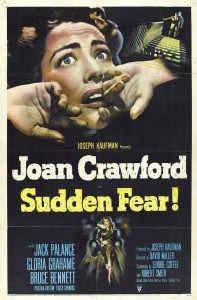
Synopsis:
A wealthy playwright (Joan Crawford) marries an actor (Jack Palance) who she recently fired from her play, not realizing that his love for her is a sham, and that, together with an old girlfriend (Gloria Grahame), he plans to murder her for her money.
|
|
Genres, Themes, Actors, and Directors:
- Gloria Grahame Films
- Homicidal Spouses
- Jack Palance Films
- Joan Crawford Films
- Plot to Murder
- Writers
Review:
In the long list of Joan Crawford titles inexplicably missing from Peary’s book, Sudden Fear is perhaps the oddest omission, given its status as both an Oscar nominee and one of Crawford’s signature flicks. It’s a taut, well-crafted thriller with atmospheric b&w cinematography, excellent use of San Francisco locales, a jazzy score by the inimitable Elmer Bernstein, several lengthy visual sequences that would do Hitchcock proud, and fine performances by the entire cast — particularly Crawford, who’s in nearly every scene. At the time of the film’s release, Crawford’s performance wasn’t very well received, with Bosley Crowther of the NY Times complaining that “a viewer not entirely a slave to Miss Crawford’s brand of histrionics might argue that an excessive amount of footage is given to close-ups of the lady in the throes of mental traumas and other emotional disturbances.” Today, however, it’s clear that Crawford is actually giving one of the best performances of her career: other than her later turn in What Ever Happened to Baby Jane? (1962), she’s never appeared so genuinely frightened or emotionally vulnerable (the sweat and tears she produces are copious).
The infamous sequence during which Myra (Crawford) accidentally overhears Palance and Grahame’s plans to murder her is particularly wrenching; Myra’s not only afraid for her life, but heartbroken and stunned to learn that her beloved husband is nothing close to what he appears. It’s a hell of a thing to learn in one fell swoop that your husband is not just deceitful but a homicidal psychopath as well. Once this “plot twist” occurs, the remainder of the film plays out with remarkable tension and suspense: while we know that Myra’s concocted a plan, and that it will likely be a good one (Myra is, after all, a renowned playwright), we have no idea exactly how the machinations of her elaborate scheme will work. To her credit, even once she learns of her husband’s untold treachery, Crawford’s Myra is rarely bitter or cynical; she dreams of revenge, but only as a means of personal survival — and we can’t help rooting for her until the film’s exciting climax.
Redeeming Qualities and Moments:
- Joan Crawford as Myra (Hudson) Blaine
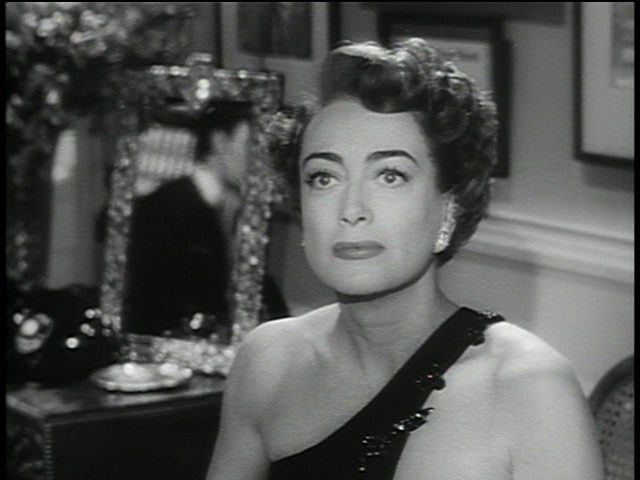
- Jack Palance as Myra’s homicidal husband
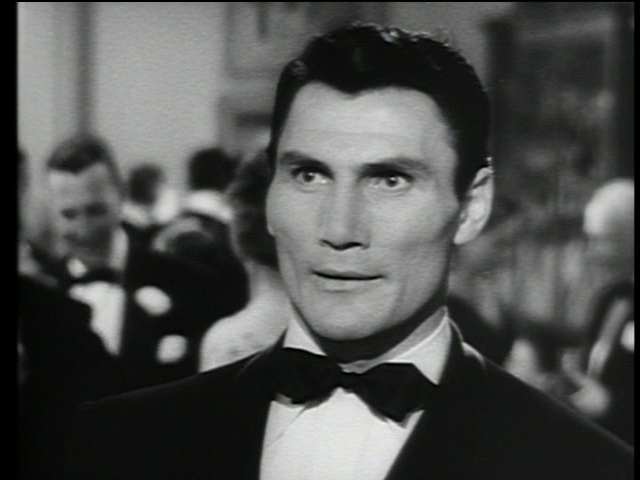
- Gloria Grahame as Irene
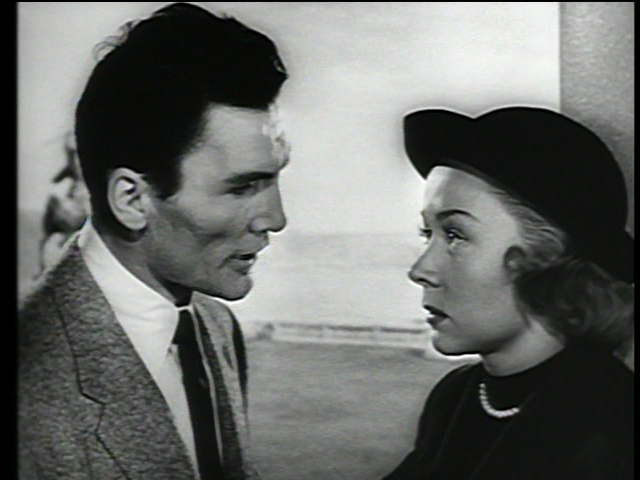
- The infamous Dictaphone revelation sequence
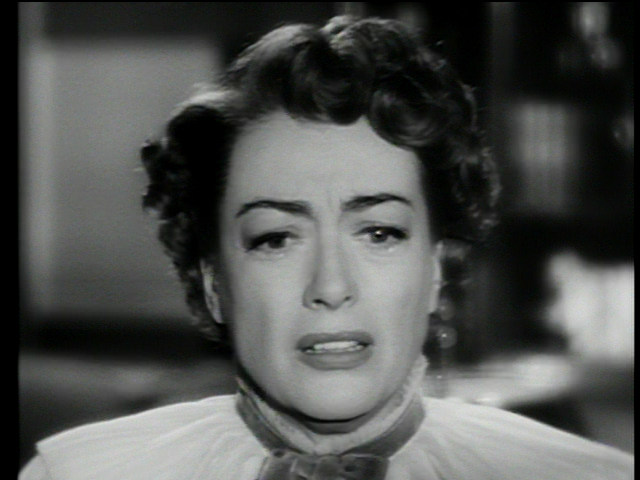
- Charles Lang’s noirish cinematography
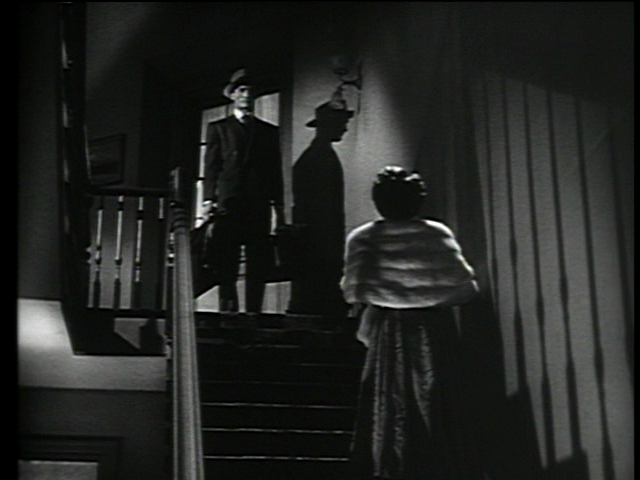
- Fine direction by David Miller
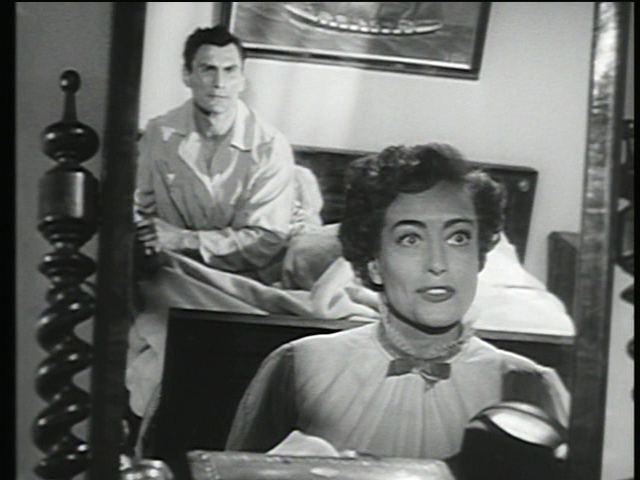
- The exciting final chase sequence
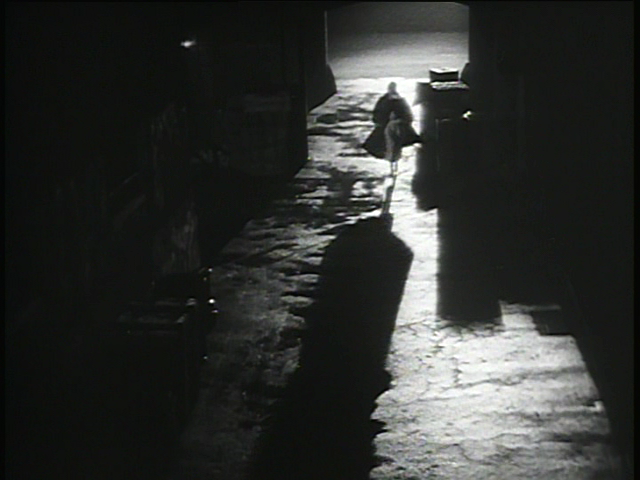
- Excellent use of hilly San Francisco locales

- A remarkably frightening depiction of spousal deception
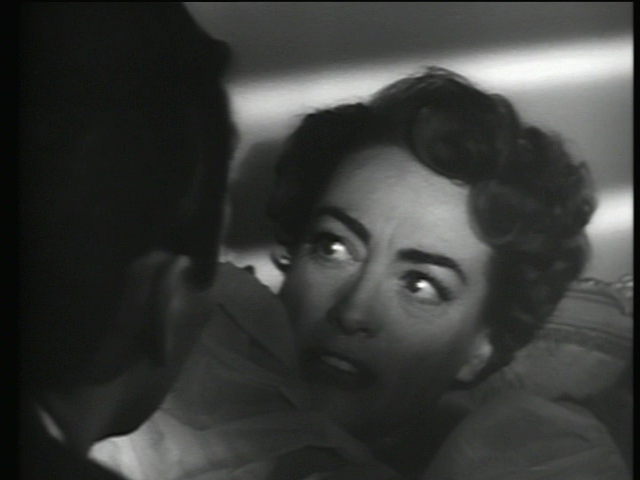
- Elmer Bernstein’s distinctive score
Must See?
Yes, as one of Crawford’s best flicks.
Categories
- Noteworthy Performance(s)
- Oscar Winner or Nominee
Links:
|










One thought on “Sudden Fear (1952)”
Must-see.
Generally speaking, ‘SF’ is a top-notch, noir-esque thriller that ffs should see at least once.
That said, it’s not without its camp touches. First of all, as witness the opening scene, Crawford’s character may be the female Arthur Miller, but she sure does write some howlingly over-ripe dialogue. That’s our first indication that we could possibly be in for more unintentionally funny stuff.
And we are: As Crawford overhears the plan to do her in, the recorded message skips as Grahame lets us all know that “I know a way. …I know a way. …I know a way.” – which is repeated endlessly until Crawford stops the recording. So, lest there be any doubt about it…well, Grahame knows a way.
But perhaps best of all comes late in the film. Being a playwright, Joan concocts her own plan for revenge – written down in easy-to-read bullet points, which Joan reviews, then memorizes, like an actress starring in her own play. This plan includes such easy-to-forget steps as “I leave house.” at a set time. This is all meant to add to the tension, of course – and it does – but it still comes off as silly.
Even though this role is among Joan’s likable characters, we’re still a little disappointed as we watch her not so much fall in love as foam at the mouth. She plans a party for Palance, for example, and – when he’s late – she calls his hotel room again and again…and again and again…and again. This also adds to the suspense…even as it shows Joan’s Myra falling into a pathetic wasteland.
In the film’s favor, though, the script is mostly solid and we’re made to overlook its various eccentricities (i.e., we learn that Myra can probably tell you what any Shakespearean quote is from: not only what act of what play, but which scene. To put it mildly…a stretch.)
Whatever warts this film may have, all is forgiven in the exciting, extended conclusion. We’re given a great pay-off indeed!